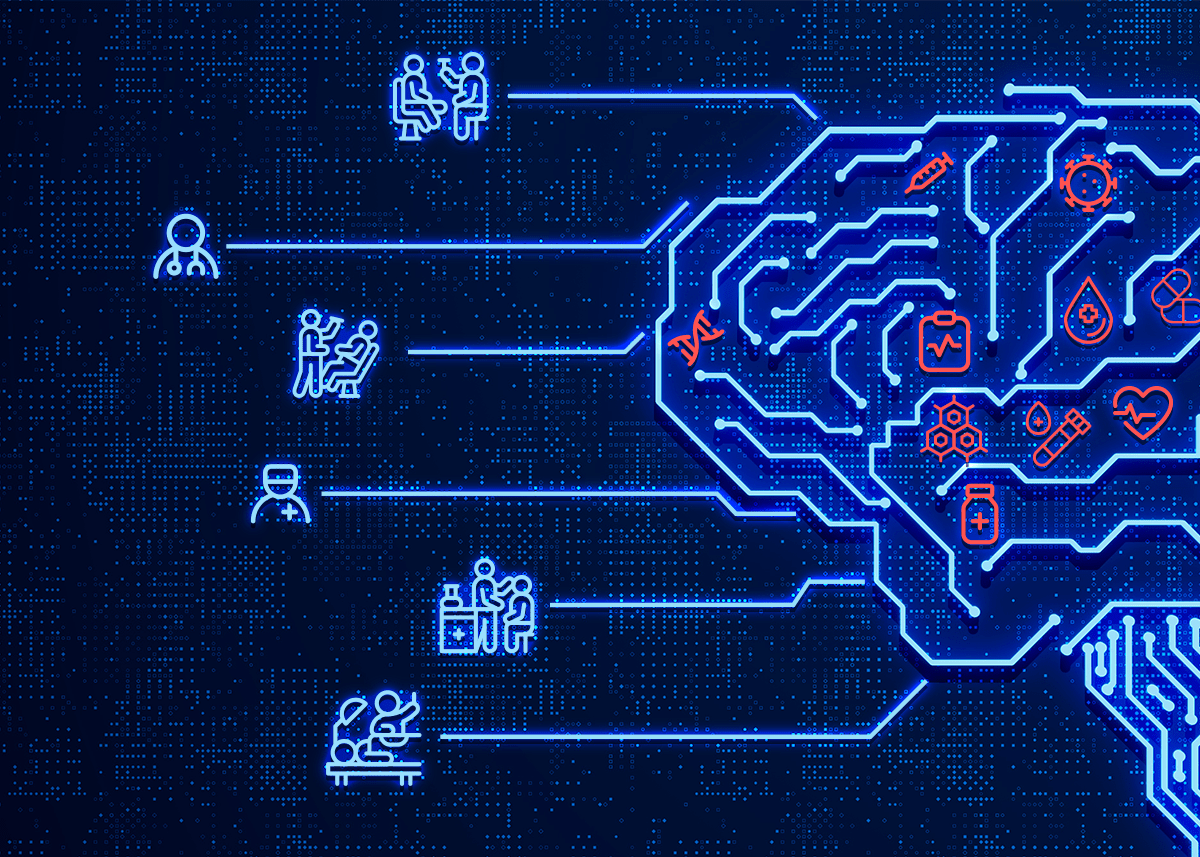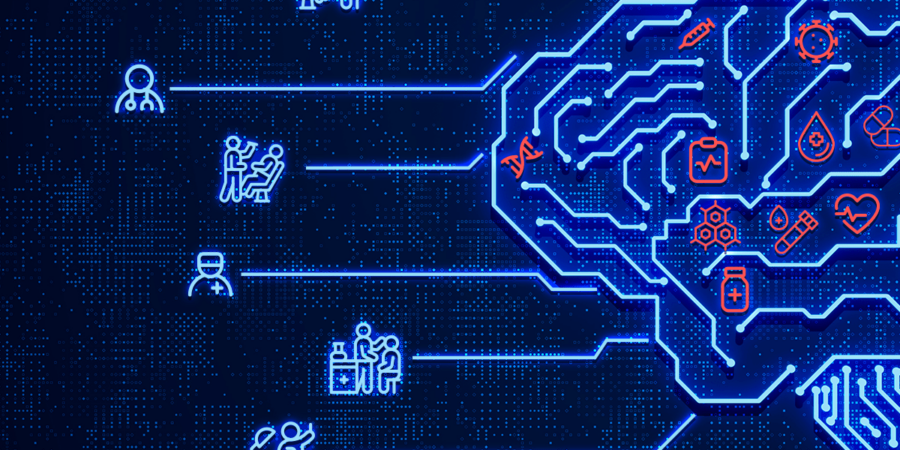Revolutionizing Healthcare Engagement: How Generative AI is Transforming Interactions with HCPs
Revolutionizing Healthcare Engagement: How Generative AI is Transforming Interactions with HCPs

A few years ago, sending a generic email was enough to maintain a relationship with healthcare professionals (HCPs). But expectations have evolved. Today, HCPs demand personalized interactions tailored to their specific needs and preferences. Why? Because in a world saturated with information, only targeted, relevant, and contextual communication can capture their attention. This is where generative AI, a true technological revolution, changes the game by driving HCP engagement through personalized and impactful communication strategies.
Imagine an intelligent CRM that not only centralizes HCP data but also automates communications, analyzes past interactions, and generates personalized recommendations. Let’s explore this revolutionary technology’s benefits, use cases, and impact.
Advantages of Generative AI for Personalized HCP Engagement
Generative AI transforms HCP engagement by offering enhanced personalization and increased efficiency. By analyzing behavioral data and specific preferences, AI creates tailored educational content, such as instructional videos or summaries of clinical studies, adapted to each medical specialty. These personalized materials and recommendations that meet HCPs’ specific needs boost satisfaction and loyalty by providing genuinely useful information for their daily practices.
Additionally, generative AI improves decision-making by leveraging robust data to identify weak signals, anticipate needs, and propose corrective actions to sustain HCP engagement. For instance, detecting a drop in interaction can trigger the automatic delivery of exclusive content or the scheduling of a personalized intervention.
This technology goes beyond personalization to enhance the efficiency and productivity of commercial and marketing teams. By generating real-time reports and optimizing omnichannel campaigns, AI allows teams to focus on high-value interactions while significantly reducing time spent on repetitive tasks. Furthermore, when integrated into CRMs, AI provides tailored recommendations for medical representatives, enabling them to address the most relevant topics during visits and maximize their impact.
In essence, generative AI does more than transform relationships with HCPs; it creates a new engagement dynamic founded on personalization, efficiency, and trust, while supporting more informed and strategic decision-making.
How Generative AI Revolutionizes HCP Interaction: CRM automation
The integration of generative AI into pharmaceutical CRMs is transforming how companies manage relationships with healthcare professionals (HCPs). It offers strategic advantages that enhance interaction efficiency, strengthen personalization, and optimize the performance of commercial and marketing teams.
-
Hyper-precise HCP Segmentation
Traditional CRM tools often rely on static criteria like specialty, location, or prescription volume. Generative AI changes this by incorporating behavioral and contextual data, creating dynamic, highly precise segments.
For example, AI can detect when an HCP frequently interacts with content on innovative therapies and instantly adapt recommendations. The CRM can automatically tailor communications and content for this professional, emphasizing relevant, personalized information. This increases interaction relevance and strengthens HCP engagement with the offered products and services.Les outils CRM traditionnels se limitaient souvent à des critères statiques tels que la spécialité, la localisation ou le volume de prescriptions. L’IA générative change la donne en intégrant des données comportementales et contextuelles, créant ainsi des segments dynamiques et ultra-précis.
Multiplier AI is a platform that delivers relevant and timely information to physicians, replacing generic messages that led to low interaction rates. By analyzing physician behaviors and preferences, the platform enabled the company to create and distribute highly personalized content across multiple channels, such as emails, social media, and direct communications through sales representatives.
A pharmaceutical company improved its engagement and communication strategies with physicians by leveraging the GenAI Doctor Data Platform from Multiplier AI. The company faced challenges with over 50% of its physician data being inaccurate, preventing sales representatives from reaching the right physicians with tailored messages. The GenAI platform cleaned and validated their database, segmented physicians by specialty, and provided real-time insights into their activities. This allowed sales representatives to engage more effectively, spending twice as much time with physicians during visits.
-
Omnichannel Campaigns Automation
In the pharmaceutical industry, an omnichannel approach ensures consistent, personalized interactions with HCPs. However, managing multiple channels and personalizing communications poses logistical challenges. CRMs integrated with generative AI automate message creation and delivery across channels like email, WhatsApp, SMS, and digital portals, while adapting to each HCP’s preferred channel. These systems also analyze the optimal time to send messages based on the professional’s habits and availability.
Bayer uses Veeva CRM to drive omnichannel engagement with HCPs and launch new drugs in over 80 countries. These tools automate message delivery across various channels, optimize campaigns in real-time, and adapt to HCP preferences.
Tom Schwenger, President and COO of Veeva : « Vault CRM et Veeva OpenData fourniront la base de l’innovation commerciale pour favoriser un engagement à la demande plus efficace, élargissant ainsi les relations HCP dans le monde entier. »
-
Real-Time Recommendations for Sales Teams
Generative AI provides strategic insights for field teams. Before each visit, the CRM generates a personalized summary of the HCP’s past interactions, identifies relevant products or services, and suggests discussion points or objections to anticipate. These recommendations help medical reps better prepare for visits, address specific HCP needs, and increase efficiency.
Veeva Systems is transforming healthcare professional (HCP) engagement through its omnichannel campaign automation tools, such as the Multi-Channel Cycle Plan (MCCP) and Crossix Omnichannel Boost. These solutions centralize campaign management across various channels (emails, SMS, remote calls, digital portals) while personalizing messages based on HCP preferences and behavior. Leveraging AI to analyze real-time data, Veeva adjusts the timing and format of communications, optimizing their impact.
This approach significantly enhances HCP engagement, increasing response rates through more relevant and tailored interactions. It strengthens the quality of exchanges and boosts the likelihood of pharmaceutical product adoption.
How Generative AI Revolutionizes HCP Interaction: CRM automation
-
Proactive Relationship Management
One of the major challenges in engaging healthcare professionals (HCPs) is detecting weak signals that indicate a loss of interest or disengagement. Generative AI incorporates predictive analytics tools capable of identifying these signals, such as a decline in email open rates or reduced campaign responses. In response, the CRM can trigger automated corrective actions, such as sending exclusive content, personalized event invitations, or even human intervention when necessary.
For example, Salesforce Health Cloud, a CRM platform designed for the healthcare and life sciences sector, integrates predictive analytics and automation features. It can detect weak signals of declining HCP engagement, such as fewer email opens or reduced digital interactions. In response, it can initiate personalized and automated actions, like sending relevant content, targeted recommendations, or reminders. If needed, it alerts commercial teams for human intervention. These features strengthen relationships with HCPs, optimize marketing campaigns, and enhance interaction efficiency by making them more relevant and timely.
Challenges and Limitations : A Promising but Demanding Technology
Despite its undeniable advantages, the use of generative AI in HCP engagement presents significant challenges that require careful attention. One of the primary obstacles is the risk of producing automatically generated content that fails to meet the strict regulatory requirements of the pharmaceutical industry, such as those established by the FDA or EMA. Such content, while personalized, may inadvertently disseminate inaccurate or non-compliant information, exposing companies to potential legal sanctions.
Furthermore, adopting generative AI raises concerns regarding the protection of sensitive HCP data—a domain where any breach could lead to confidentiality violations or reputational damage. For example, when an AI-powered CRM mistakenly sends inappropriate recommendations to certain physicians due to misinterpreted preference data, it can result in a temporary loss of trust among the affected professionals. This may compel the pharmaceutical company to implement human verification of generated content and re-evaluate its algorithms to prevent future incidents.
These challenges highlight the importance of rigorous human oversight and an ethical approach to the implementation of generative AI, ensuring responsible and effective use.
As Arno Sosna, General Manager of CRM Products at Veeva, emphasizes: « Vault CRM Bot et Vault CRM Voice Control apportent les dernières avancées en matière d’IA générative dans Vault CRM pour des représentants plus efficaces et plus productifs. »

